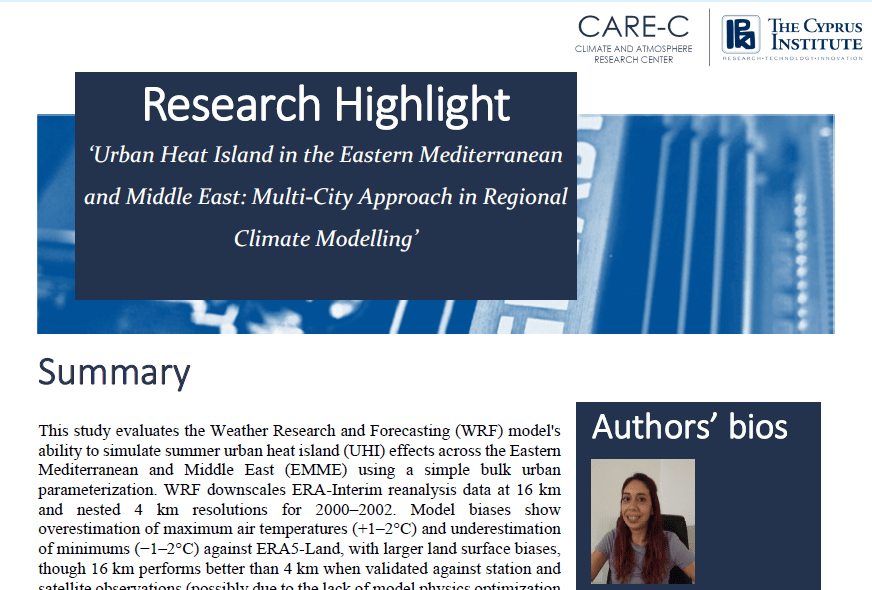EMME-CARE
A regional Centre of Excellence for climate and atmosphere research in the Eastern Mediterranean and Middle East region.
What We Do
Our Latest News
-
![CARE-C seminar with guest speaker Dr. Ajit Ahlawat]()
CARE-C seminar with guest speaker Dr. Ajit Ahlawat
February 19, 2026 -
![LIFE SIRIUS project completion: A System for Integrated Environmental Information in Urban Areas]()
LIFE SIRIUS project completion: A System for Integrated E…
January 30, 2026 -
![Prof Philippe Ciais Named World’s No.1 Environmental Scientist]()
Prof Philippe Ciais Named World’s No.1 Environmental Scie…
January 30, 2026 -
![Cattle Farming at Risk as Climate Change Increases Thermal Stress]()
Cattle Farming at Risk as Climate Change Increases Therma…
January 29, 2026 -
![Professor Mihalis Vrekoussis, of CARE-C awarded the special honour of the Berninghausen Prize for Excellence in Teaching.]()
Professor Mihalis Vrekoussis, of CARE-C awarded the speci…
January 23, 2026 -
![CARE-C Researchers Participate at the OneSTOP Datathon Workshop in Brussels]()
CARE-C Researchers Participate at the OneSTOP Datathon Wo…
December 08, 2025
Research Highlight

Urban Heat Island in the Eastern Mediterranean and Middle East: Multi-City Approach in Regional Climate Modelling
This study evaluates the Weather Research and Forecasting (WRF) model’s ability to simulate summer urban heat island (UHI) effects across the Eastern Mediterranean and Middle East (EMME) using a simple bulk urban parameterization. WRF downscales ERA-Interim reanalysis data at 16 km and nested 4 km resolutions for 2000–2002. Model biases show overestimation of maximum air temperatures (+1–2°C) and underestimation of minimums (−1–2°C) against ERA5-Land, with larger land surface biases, though 16 km performs better than 4 km when validated against station and satellite observations (possibly due to the lack of model physics optimization in the highest resolution). Detailed analysis for Cairo reveals nighttime
air/surface UHIs of 3–5°C and daytime surface cool islands of 5–10°C, driven by urban-rural contrasts in albedo, soil moisture, and heat storage. Averaged across 11 EMME cities, results indicate stronger nighttime surface UHIs (5–6°C) than air UHIs (3–4°C), with pronounced daytime surface cool islands (−12.5°C) and minor canopy heat islands (1–1.5°C). The results indicate the suitability of the simple urban model treatment for multi-city regional climate change assessments in the EMME region.
Find us
Cyprus Institute
2121, Aglantzia
Nicosia, Cyprus










